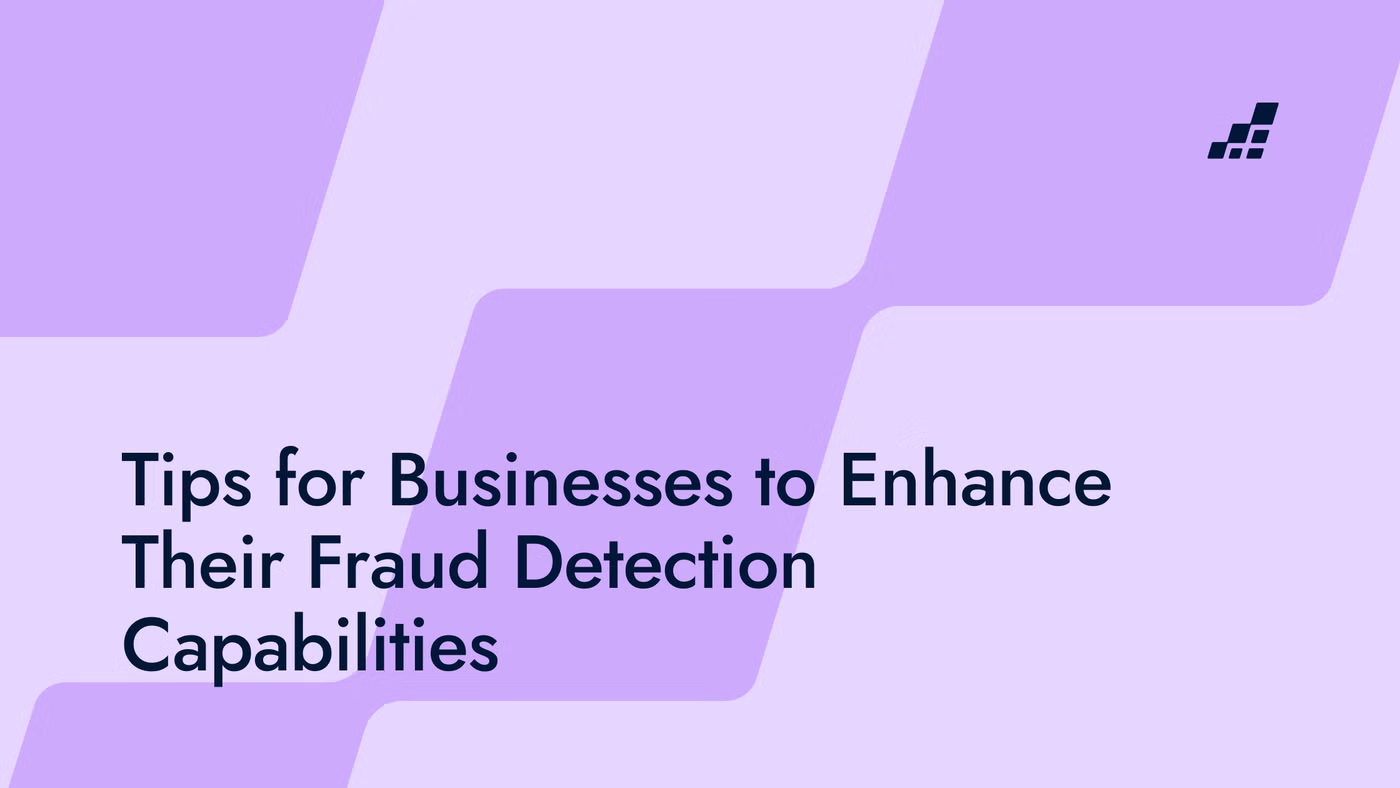- /
- Blog
Tips for Businesses to Enhance Fraud Detection Capabilities

Navigating through today’s dynamic business world, fraud is a real concern for companies everywhere. The sting of fraud can hit severely, causing financial losses as well as tarnished reputations and potential legal troubles.
In light of this, businesses must place fraud detection high on their agenda, crafting solid strategies to uncover and prevent fraud.
In this piece, we will walk through several hands-on tips that can significantly boost your company’s knack for spotting fraud, helping you keep your operations secure and your peace of mind intact.
Understanding the Importance of Fraud Detection
The fallout caused by fraud stretches far and wide within a business. It is not just about the hit to your bottom line but also about the customer trust you lose and the dent in your company's image.
To lessen these risks, it’s crucial for organizations to grasp just how deeply fraud can impact their day-to-day and long-term operations.
Understanding the importance of fraud detection helps businesses stay ahead of these threats, protecting their assets and paving the way for sustained success.
The Impact of Fraud on Businesses
Missing the signs of fraud can lead to significant consequences. Beyond the obvious financial blow, which can run into millions of dollars lost to deceitful schemes each year, there's much more at stake.
Companies can find themselves tangled in legal issues and see their carefully built reputation get tarnished which is a setback that often demands years of effort to mend.
Moreover, fraud can disrupt business operations, hindering productivity and siphoning off resources that could be better used elsewhere.
Given the limited time and resources available, businesses need to channel their efforts into effective fraud detection strategies. Doing so not only sidesteps these potential pitfalls but also ensures that the business engine runs without a hitch, maintaining operational efficiency.
Why Businesses Need to Prioritize Fraud Detection
The saying "prevention is better than cure" is especially true for fraud detection. By prioritizing it, companies can halt fraudulent activities before they cause significant harm.
A robust fraud detection system demonstrates a business's commitment to ethical practices and enhances trust with customers, suppliers, and partners.
This proactive approach also communicates to employees that fraud will not be tolerated, fostering transparency and responsibility.
Fraud detection needs to be customized, as risks vary across industries. For example, the challenges faced by e-commerce are different from those in banking. Tailoring approaches to specific vulnerabilities is crucial for effectiveness.
Keeping pace with evolving fraud tactics and technologies is essential to stay ahead. Investing in advanced fraud detection tools and regularly updating them ensures businesses can keep up with new threats.
Fraud detection is a forward-looking strategy essential for safeguarding a company’s assets and securing its future success.
By understanding the impact of fraud and implementing solid systems, organizations can mitigate risks and cultivate a culture of openness and integrity.
Key Elements of an Effective Fraud Detection System
These technologies enable the rapid identification of anomalies. Incorporating them is crucial for quick responses to potential fraud, ensuring an effective detection system.
For organizations looking to strengthen their fraud detection, creating a powerful system is essential.
Essential Features of a Robust Fraud Detection System
A strong fraud detection system is marked by a few essential features.
At its foundation, it must efficiently analyze extensive data sets from multiple sources — ranging from financial transactions and employee activities to customer behavior. This approach allows businesses to identify fraud across different areas of operation.
Moreover, the system should be equipped with advanced algorithms capable of patterns and trends, thus highlighting questionable activities for further examination.
Steps to Enhance Fraud Detection Capabilities
Boosting fraud detection efforts involves a comprehensive strategy. Here are essential steps companies can undertake:
- Frequent Fraud Risk Evaluations: Vital for identifying and strengthening areas vulnerable to fraud through detailed analysis of current practices, systems, and employee behavior.
- Strong Internal Controls: Essential for fraud prevention and detection, this approach involves separating tasks, setting clear authority limits, and restricting access to sensitive information. It’s supported by regular monitoring and audits.
- Advanced Fraud Detection Software: A key investment that uses the latest algorithms and machine learning to identify irregularities, streamlining monitoring and minimizing false positives.
- Fraud Awareness Training for Employees: Crucial for equipping staff with the skills to recognize and act on fraud indicators, fostering a culture of vigilance and collective responsibility against fraud.
Overcoming Challenges in Fraud Detection
While enhancing fraud detection capabilities is vital, businesses may encounter various challenges along the way. Here are some common issues and strategies to overcome them:
- Dealing with False Positives in Fraud Detection: Handling false positives—legitimate actions flagged as fraud—is crucial to prevent business disruption and maintain trust. Improving fraud detection methods is key to reducing these errors and ensuring valid transactions go through smoothly.
- Ensuring Data Privacy While Detecting Fraud: Fraud detection requires analyzing a lot of data, so protecting customer privacy is essential.
Businesses need to use strong data protection, like encryption and clear rules, to keep customer data safe while fighting fraud. This way, they can prevent fraud without risking customer data security.
Managing the Cost of Fraud Detection
Investing in a solid fraud detection system is a necessary expense to safeguard a business's assets and reputation. However, the financial aspect of deploying such systems can be intimidating, especially for smaller businesses facing tight budgets.
These approaches offer access to state-of-the-art technology and expertise without the need for significant initial investment.
Ultimately, putting fraud detection high on the priority list is non-negotiable for maintaining a company's financial health and reputation.
It's crucial to recognize fraud detection's role, build a thorough system, and keep improving it to beat fraud.
Using flexible approaches, new tech, and keeping everyone alert helps fight fraud and protect everyone involved.
To further bolster your fraud detection capabilities, consider leveraging innovative solutions like DataSnipper.

.png?width=600&quality=70&format=auto&crop=16%3A9)
.png?width=600&quality=70&format=auto&crop=16%3A9)